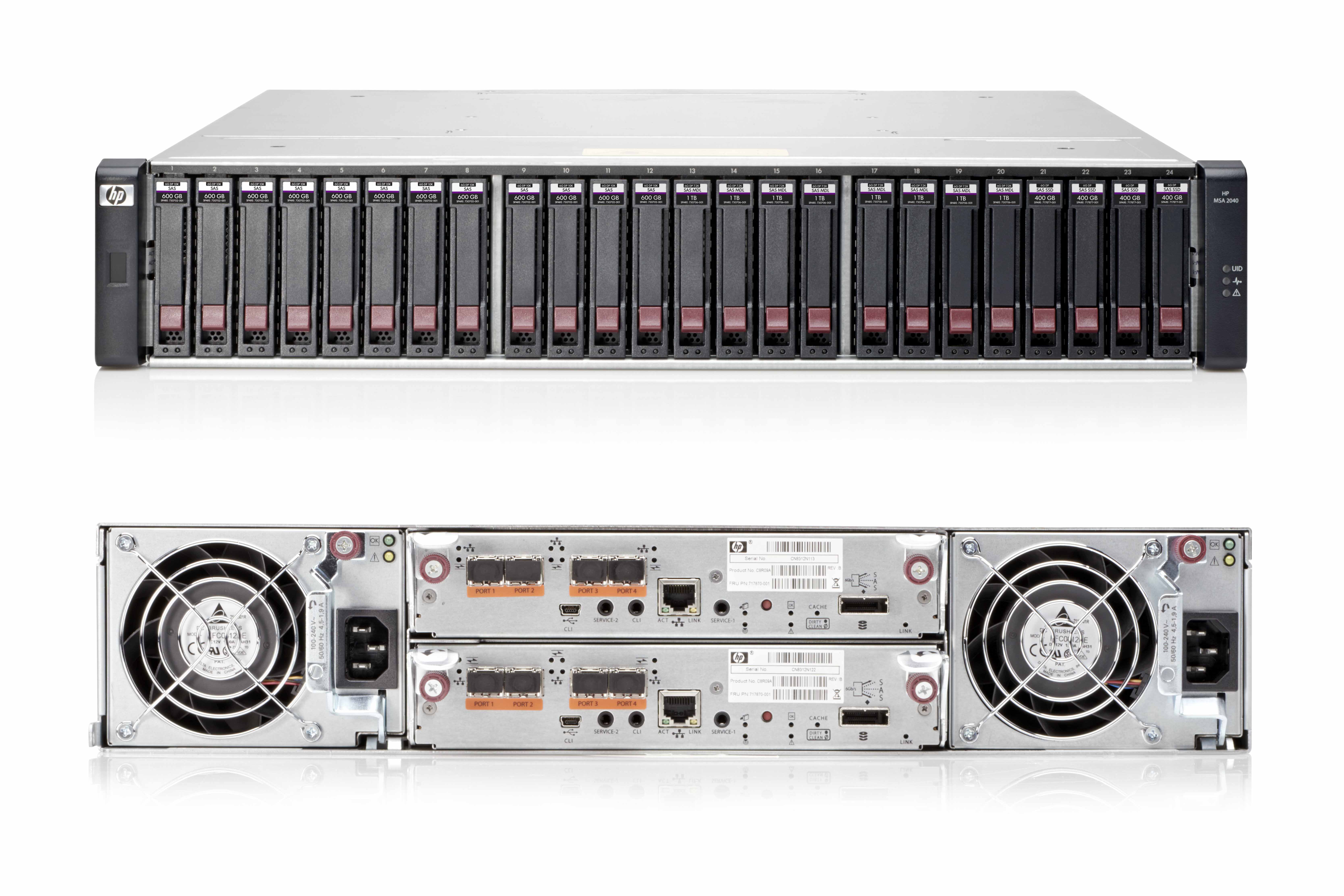HP MSA 2040 Storage (2015) review
HP new Gen4 MSA 2040 delivers enterprise storage virtualisation at an SMB price


HP’s new virtualisation features make one of the best SMB storage arrays on the market even better. The MSA 2040 is easy to deploy and the automated data tiering features boost performance and lower storage costs
-
+
Automated data tiering; Converged FC/IP SAN data ports; Top value, High expansion; Excellent performance
-
-
New web console takes some getting used to; virtual volumes only support manual snapshots

FC and iSCSI performance
For testing, we used an HP ProLiant DL380 Gen9 server (web ID:23173) equipped with QLogic 8Gbps FC and Emulex 10GbE adapter cards. We found FC performance on the money with Iometer reporting raw sequential read and write speeds of 785MB/sec for a volume on the standard virtual tier.
IP SAN speeds were equally good with a 500GB target on the same tier delivering raw read and write speeds of 1,150MB/sec and 965MB/sec.
To test read cache performance, we ran a baseline Iometer test on a 750GB iSCSI target with a 90/10 random read/write spread which returned around 2,000 IOPS. We added a read cache disk group using two 200GB SSDs and saw the same test deliver near to 9,000 IOPS after a 90 minute warm up period.
Next, we deleted the read cache and used the same SSDs to create a virtual disk group which the MSA 2040 automatically classified as a performance tier. After leaving the same Iometer test running for an hour, we watched throughput rising swiftly to over 37,000 IOPS and could see from the console's performance page that all the I/O action had shifted onto the SSD-based tier.
Conclusion
It took us a while to get used to HP's new web console but found the data tiering features easy to configure as most of it is automated. Our speed tests show it's capable of boosting performance substantially and at a price the competition won't be able to match.
Verdict
HP’s new virtualisation features make one of the best SMB storage arrays on the market even better. The MSA 2040 is easy to deploy and the automated data tiering features boost performance and lower storage costs
Chassis: 2U rack Storage: 12 x LFF or 24 x SFF hot-swap drive bays Power: 2 x 500W hot-plug PSUs Two controllers each with the following: Memory: 4GB cache with super-capacitor and CompactFlash card RAID support: RAID1, 10, 5, 6 Data ports: 4 x SFP+ supporting 8/16Gbps FC and/or 10GbE iSCSI Management: 10/100 Ethernet Expansion: 6Gbps SAS port (max 96 LFF/199 SFF disks) Other ports: Mini-USB CLI port Snapshots: 64/512 (Standard/Maximum) Management: Web browser
Get the ITPro daily newsletter
Sign up today and you will receive a free copy of our Future Focus 2025 report - the leading guidance on AI, cybersecurity and other IT challenges as per 700+ senior executives
Dave is an IT consultant and freelance journalist specialising in hands-on reviews of computer networking products covering all market sectors from small businesses to enterprises. Founder of Binary Testing Ltd – the UK’s premier independent network testing laboratory - Dave has over 45 years of experience in the IT industry.
Dave has produced many thousands of in-depth business networking product reviews from his lab which have been reproduced globally. Writing for ITPro and its sister title, PC Pro, he covers all areas of business IT infrastructure, including servers, storage, network security, data protection, cloud, infrastructure and services.
-
 Women show more team spirit when it comes to cybersecurity, yet they're still missing out on opportunities
Women show more team spirit when it comes to cybersecurity, yet they're still missing out on opportunitiesNews While they're more likely to believe that responsibility should be shared, women are less likely to get the necessary training
By Emma Woollacott Published
-
 OpenAI wants developers using its new GPT-4.1 models – but how do they compare to Claude and Gemini on coding tasks?
OpenAI wants developers using its new GPT-4.1 models – but how do they compare to Claude and Gemini on coding tasks?News OpenAI says its GPT-4.1 model family offers sizable improvements for coding, but tests show competitors still outperform it in key areas.
By Ross Kelly Published
-
 Meta just revived plans to train AI models with European user data – here’s how you can opt out
Meta just revived plans to train AI models with European user data – here’s how you can opt outNews Meta has confirmed plans to train AI models using European users’ public content and conversations with its Meta AI chatbot.
By Nicole Kobie Published